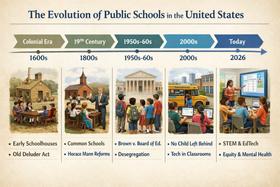Serving 722 students in grades Prekindergarten-5, Freeman Elementary School ranks in the top 30% of all schools in Texas for overall test scores (math proficiency is top 20%, and reading proficiency is top 20%).
The percentage of students achieving proficiency in math is 60% (which is higher than the Texas state average of 44%). The percentage of students achieving proficiency in reading/language arts is 54% (which is higher than the Texas state average of 51%).
The student-teacher ratio of 17:1 is higher than the Texas state level of 14:1.
Minority enrollment is 97% of the student body (majority Asian), which is higher than the Texas state average of 75% (majority Hispanic and Black).
Quick Facts (2026)
- Grades: Prekindergarten-5
- Enrollment: 722 students
- Student-Teacher Ratio: 17:1
- Minority Enrollment: 97%
- Overall Testing Rank: Top 30% in TX
- Math Proficiency: 60% (Top 20%)
- Reading Proficiency: 54% (Top 50%)
- Science Proficiency: 40-44% (Top 50%)
- Source: National Center for Education Statistics (NCES), TX Dept. of Education
Top Rankings
Freeman Elementary School ranks among the top 20% of public schools in Texas for:
Category
Attribute
Math Proficiency
School Overview
Freeman Elementary School's student population of 722 students has stayed relatively flat over five school years.
The teacher population of 43 teachers has stayed relatively flat over five school years.
Grades Offered
Grades Prekindergarten-5
Total Students
722 students
Gender %
Total Classroom Teachers
43 teachers
School Rankings
Freeman Elementary School ranks within the top 30% of all 8,096 schools in Texas (based off of combined math and reading proficiency testing data).
The diversity score of Freeman Elementary School is 0.50, which is less than the diversity score at state average of 0.64. The school's diversity has stayed relatively flat over five school years.
Overall Testing Rank
#2114 out of 8096 schools
(Top 30%)
(Top 30%)
Math Test Scores (% Proficient)
60%
44%
Reading/Language Arts Test Scores (% Proficient)
54%
51%
Science Test Scores (% Proficient)
40-44%
46%
Student-Teacher Ratio
17:1
14:1
American Indian
2%
n/a
Asian
68%
6%
Hispanic
7%
53%
Black
18%
13%
White
3%
25%
Hawaiian
n/a
n/a
Two or more races
2%
3%
All Ethnic Groups
Participates in the National School Lunch Program (NSLP)
Yes
Eligible for Free Lunch
23%
57%
Eligible for Reduced Lunch
3%
5%
School Statewide Testing
School District Name
Source: National Center for Education Statistics (NCES), TX Dept. of Education
Frequently Asked Questions
What is Freeman Elementary School's ranking?
Freeman Elementary School is ranked #2114 out of 8,096 schools, which ranks it among the top 30% of public schools in Texas.
What schools are Freeman Elementary School often compared to?
Freeman Elementary Schoolis often viewed alongside schools like Valley Ranch Elementary School, Las Colinas Elementary School by visitors of our site.
What percent of students have achieved state testing proficiency in math and reading?
60% of students have achieved math proficiency (compared to the 44% TX state average), while 54% of students have achieved reading proficiency (compared to the 51% TX state average).
How many students attend Freeman Elementary School?
722 students attend Freeman Elementary School.
What is the racial composition of the student body?
68% of Freeman Elementary School students are Asian, 18% of students are Black, 7% of students are Hispanic, 3% of students are White, 2% of students are American Indian, and 2% of students are Two or more races.
What is the student-teacher ratio of Freeman Elementary School?
Freeman Elementary School has a student ration of 17:1, which is higher than the Texas state average of 14:1.
What grades does Freeman Elementary School offer ?
Freeman Elementary School offers enrollment in grades Prekindergarten-5
What school district is Freeman Elementary School part of?
Freeman Elementary School is part of Carrollton-Farmers Branch Independent School District.
In what neighborhood is Freeman Elementary School located?
Freeman Elementary School is located in the Valley Ranch neighborhood of Irving, TX. There are 5 other public schools located in Valley Ranch.
School Reviews
5 10/10/2025
The Best Pre-K program ever! The school principal, Mrs. Campbell is so friendly, kind, and supportive! The Pre-K class F teachers, Ms. Gonzales and Mrs. Uzma are so kind, creative, loving, and caring. The Pre-K program is full of fun activities! The school is so neat and clean! My son had a lot of opportunities to have fun, learn, and grow! He cannot wait to return to Kindergarten this fall! Thank you so very much for being the Best Role Models for my son! He is truly blessed to have you all as his dear Freeman family!
Review Freeman Elementary School. Reviews should be a few sentences in length. Please include any comments on:
- Quality of academic programs, teachers, and facilities
- Availability of music, art, sports and other extracurricular activities
Recent Articles

Do We Still Need Libraries in Public Schools in 2026
An updated look at the role of public school libraries in 2026, their impact on literacy, equity, and digital learning, and why they remain essential today.

The History of Public Schools in the United States
Explore the history of public schools in the U.S., from colonial roots to 2026 reforms shaping equity, funding, and classroom innovation.

Special-Program Registration Deadlines Explained
Learn what to know about special-program registration deadlines for magnet, CTE, and dual-enrollment options in public schools.





